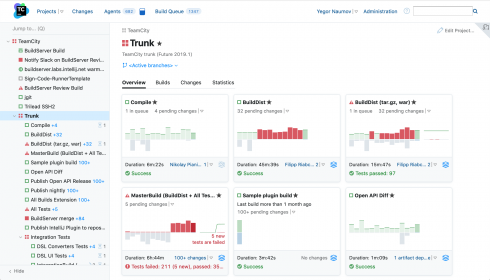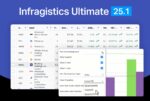
The 2019.1 release of TeamCity is now available with a redesigned UI, native GitLab integration and support for GitLab and Bitbucket pull requests. It also offers token-based authentication, detection and reporting of Go tests, faster build agent upgrades, and AWS Spot Fleet requests.
The UI now works as a single-page application, which means all changes can be viewed in real-time, and it adds features such as a new sidebar, a dashboard-style project overview and a branches tab that displays the default branch.
Users of TeamCity 2019.1 can get full support for GitLab and GitLab merge requests by picking a GitLab project from the list.
More information is available here.
Genode OS framework 19.05 released
The Genode OS framework 19.05 adds compatibility with the 64-bit ARM architecture (AARCH64), comes with improvements of the various kernels targeted by the framework, and extends the list of supported hardware.
The release also adds board and kernel-agnostic build directories to increase the velocity of Genode system scenarios. The new kernel-agnostic virtualization interface lets one virtual machine monitor implementation combine with kernels such as NOVA, seL4, or Fiasco.
In addition, Genode OS’s port of OpenJDK can now host the Spring framework and Tomcat web server.
Equalum announces Series B round of funding for real-time data ingestion platform
Real-time data ingestion platform Equalum secured $18 million in its Series B funding round to further expansion in Europe and expand its partnerships.
Equalum uses open-source big data frameworks like Spark and Kafka to enable companies with data-rich enterprises to consolidate data from disparate systems into central stores like warehouses and data lakes to power real-time analytics, according to the company’s post.
“The need for access to real-time insights across industries including manufacturing, finance, healthcare, retail, and media has never been greater,” said Giovanni Canetta Roeder, managing partner at Planven, who participated in the round of funding.
Workflow modeling tool Cawemo is now free
Workflow automation provider Camuda announced that businesses can now map their processes as workflows for free with Cawemo.
Cawemo enables multiple individuals to collaborate on workflow processes on a single platform. It uses the uses the BPMN 2.0 standard modeling language to graphically visualize workflows, which can be embedded in websites and exported as graphics for text documents.
“Companies undergoing digital transformation need to automate core business processes in a collaborative effort with software developers, as well as business stakeholders,” said Jakob Freund, the CEO and co-founder of Camunda.






